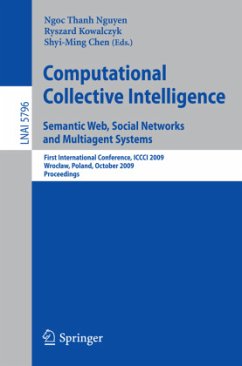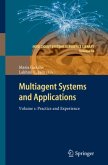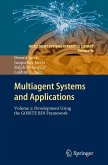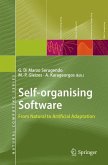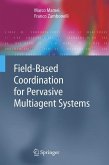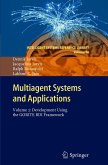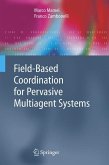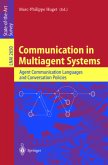Computational Collective Intelligence. Semantic Web, Social Networks and Multiagent Systems
First International Conference, ICCCI 2009, Wroclaw, Poland, October 5-7, 2009, Proceedings
Herausgegeben:Nguyen, Ngoc Thanh; Kowalczyk, Ryszard; Chen, Shyi-Ming
Computational Collective Intelligence. Semantic Web, Social Networks and Multiagent Systems
First International Conference, ICCCI 2009, Wroclaw, Poland, October 5-7, 2009, Proceedings
Herausgegeben:Nguyen, Ngoc Thanh; Kowalczyk, Ryszard; Chen, Shyi-Ming
- Broschiertes Buch
- Merkliste
- Auf die Merkliste
- Bewerten Bewerten
- Teilen
- Produkt teilen
- Produkterinnerung
- Produkterinnerung
Computational collective intelligence (CCI) is most often understood as a subfield of artificial intelligence (AI) dealing with soft computing methods that enable group decisions to be made or knowledge to be processed among autonomous units acting in distributed environments. The needs for CCI techniques and tools have grown signi- cantly recently as many information systems work in distributed environments and use distributed resources. Web-based systems, social networks and multi-agent systems very often need these tools for working out consistent knowledge states, resolving conflicts and…mehr
Andere Kunden interessierten sich auch für
![Multiagent Systems and Applications Multiagent Systems and Applications]() Multiagent Systems and Applications75,99 €
Multiagent Systems and Applications75,99 €![Multiagent Systems and Applications Multiagent Systems and Applications]() Dennis JarvisMultiagent Systems and Applications75,99 €
Dennis JarvisMultiagent Systems and Applications75,99 €![Self-organising Software Self-organising Software]() Self-organising Software75,99 €
Self-organising Software75,99 €![Field-Based Coordination for Pervasive Multiagent Systems Field-Based Coordination for Pervasive Multiagent Systems]() Marco MameiField-Based Coordination for Pervasive Multiagent Systems75,99 €
Marco MameiField-Based Coordination for Pervasive Multiagent Systems75,99 €![Multiagent Systems and Applications Multiagent Systems and Applications]() Dennis JarvisMultiagent Systems and Applications75,99 €
Dennis JarvisMultiagent Systems and Applications75,99 €![Field-Based Coordination for Pervasive Multiagent Systems Field-Based Coordination for Pervasive Multiagent Systems]() Marco MameiField-Based Coordination for Pervasive Multiagent Systems81,99 €
Marco MameiField-Based Coordination for Pervasive Multiagent Systems81,99 €![Communication in Multiagent Systems Communication in Multiagent Systems]() Marc-Phillipe Huget (ed.)Communication in Multiagent Systems41,99 €
Marc-Phillipe Huget (ed.)Communication in Multiagent Systems41,99 €-
-
-
Computational collective intelligence (CCI) is most often understood as a subfield of artificial intelligence (AI) dealing with soft computing methods that enable group decisions to be made or knowledge to be processed among autonomous units acting in distributed environments. The needs for CCI techniques and tools have grown signi- cantly recently as many information systems work in distributed environments and use distributed resources. Web-based systems, social networks and multi-agent systems very often need these tools for working out consistent knowledge states, resolving conflicts and making decisions. Therefore, CCI is of great importance for today's and future distributed systems. Methodological, theoretical and practical aspects of computational collective int- ligence, such as group decision making, collective action coordination, and knowledge integration, are considered as the form of intelligence that emerges from the collabo- tion and competition of many individuals (artificial and/or natural). The application of multiple computational intelligence technologies such as fuzzy systems, evolutionary computation, neural systems, consensus theory, etc. , can support human and other collective intelligence and create new forms of CCI in natural and/or artificial s- tems.
Produktdetails
- Produktdetails
- Lecture Notes in Computer Science 5796
- Verlag: Springer / Springer Berlin Heidelberg / Springer, Berlin
- Artikelnr. des Verlages: 978-3-642-04440-3
- Seitenzahl: 860
- Englisch
- Abmessung: 33mm x 156mm x 236mm
- Gewicht: 1306g
- ISBN-13: 9783642044403
- ISBN-10: 3642044409
- Artikelnr.: 26984361
- Herstellerkennzeichnung Die Herstellerinformationen sind derzeit nicht verfügbar.
- Lecture Notes in Computer Science 5796
- Verlag: Springer / Springer Berlin Heidelberg / Springer, Berlin
- Artikelnr. des Verlages: 978-3-642-04440-3
- Seitenzahl: 860
- Englisch
- Abmessung: 33mm x 156mm x 236mm
- Gewicht: 1306g
- ISBN-13: 9783642044403
- ISBN-10: 3642044409
- Artikelnr.: 26984361
- Herstellerkennzeichnung Die Herstellerinformationen sind derzeit nicht verfügbar.
Keynote Speeches.- Rough Set Approach to Knowledge Discovery about Preferences.- Toward a Self-referential Collective Intelligence Some Philosophical Background of the IEML Research Program.- A-Teams and Their Applications.- Collective Decision Making.- Local Search Algorithms for Core Checking in Hedonic Coalition Games.- Information Foraging Theory as a Form of Collective Intelligence for Social Search.- SAM: Semantic Argumentation Based Model for Collaborative Knowledge Creation and Sharing System.- A Conception for Modification of Learning Scenario in an Intelligent E-learning System.- Firefly Algorithm for Continuous Constrained Optimization Tasks.- Distributed Data Mining Methodology with Classification Model Example.- A Token-Based Mutual Exclusion Approach to Improve Collaboration in Distributed Environments.- Discovering Medical Knowledge from Data in Patients' Files.- Towards an Increase of Collective Intelligence within Organizations Using Trust and Reputation Models.- A New Ant Colony Optimization Algorithm with an Escape Mechanism for Scheduling Problems.- Recognizing Team Formations in Multiagent Systems: Applications in Robotic Soccer.- Semi-traces and Their Application in Concurrency Control Problem.- Design of the Directory Facilitator Supporting Fault-Tolerance in Multi-OSGi Agent System.- Multiagent Systems.- Agent-Based Provisioning of Group-Oriented Non-linear Telecommunication Services.- A Multi-agent Model of Deceit and Trust in Intercultural Trade.- Implementation of Epistemic Operators for Model Checking Multi-agent Systems.- Meta-game HOLOS as a Multi-agent Decision-Making Laboratory.- Agent-Based Computational Modeling of Emergent Collective Intelligence.- Fuzzy Cognitive and Social Negotiation Agent Strategy for Computational CollectiveIntelligence.- A Multi-agent Architecture for Multi-robot Surveillance.- Designing Social Agents with Empathic Understanding.- Multi-agent Systems in Pedestrian Dynamics Modeling.- Towards a Model for Extraction of Possible Worlds and Accessibility Relation from Cognitive Agent's Experience.- Social Networks.- On Deriving Tagsonomies: Keyword Relations Coming from Crowd.- d 2 isco: Distributed Deliberative CBR Systems with jCOLIBRI.- Model of a Collaboration Environment for Knowledge Management in Competence-Based Learning.- PlWiki - A Generic Semantic Wiki Architecture.- Properties of Bridge Nodes in Social Networks.- Semantic Web.- Use of Semantic Principles in a Collaborative System in Order to Support Effective Information Retrieval.- Assessing Semantic Quality of Web Directory Structure.- Computer Aided Requirements Management.- BizKB: A Conceptual Framework for Dynamic Cross-Enterprise Collaboration.- A Simple Parallel Reasoning System for the Description Logic.- SemCards: A New Representation for Realizing the Semantic Web.- ExpTime Tableaux for Checking Satisfiability of a Knowledge Base in the Description Logic .- Semantically Enhanced Intellectual Property Protection System - SEIPro2S.- Semantic Knowledge Representation in Terrorist Threat Analysis for Crisis Management Systems.- Consensus Choice for Reconciling Social Collaborations on Semantic Wikis.- Ontology Management.- Ontology Mapping Composition for Query Transformation in Distributed Environment.- Algebra of Ontology Modules for Semantic Agents.- Grouping Results of Queries to Ontological Knowledge Bases by Conceptual Clustering.- Applying the c.DnS Design Pattern to Obtain an Ontology for Investigation Management System.- Ontology Applications for Achieving Situation Awareness inMilitary Decision Support Systems.- A Collaborative Ontology-Based User Profiles System.- Ontology-Based Intelligent Agent for Grid Resource Management.- Special Session: Dynamics of Real-World Social Networks.- The Norm Game on a Model Network: A Critical Line.- Model for Trust Dynamics in Service Oriented Information Systems.- Collective Prisoner's Dilemma Model of Artificial Society.- Special Session: Nature-Inspired Collective Intelligence.- DES Control Synthesis and Cooperation of Agents.- Parameter Tuning for the Artificial Bee Colony Algorithm.- A Modified Ant-Based Approach to Edge Detection.- A Hybrid Evolutionary Approach for the Protein Classification Problem.- A Family of GEP-Induced Ensemble Classifiers.- Handling Dynamic Networks Using Ant Colony Optimization on a Distributed Architecture.- Modelling Shortest Path Search Techniques by Colonies of Cooperating Agents.- Natural Scene Retrieval Based on Graph Semantic Similarity for Adaptive Scene Classification.- Special Session: Web Systems Analysis.- A Hybrid Architecture for E-Procurement.- Localization by Wireless Technologies for Managing of Large Scale Data Artifacts on Mobile Devices.- Avoiding Threats Using Multi Agent System Planning for Web Based Systems.- Using WordNet to Measure the Similarity of Link Texts.- Mining Frequent Purchase Behavior Patterns for Commercial Websites.- Block Map Technique for the Usability Evaluation of a Website.- Global Distribution of HTTP Requests Using the Fuzzy-Neural Decision-Making Mechanism.- Deterministic Processing of WWW Pages by the Web Service.- Special Session: Collective Intelligence for Economic Data Analysis.- Comparative Analysis of Regression Tree Models for Premises Valuation Using Statistica Data Miner.- Electronic Trading on Electricity Marketswithin a Multi-agent Framework.- Comparative Analysis of Premises Valuation Models Using KEEL, RapidMiner, and WEKA.- A Multi-agent System to Assist with Real Estate Appraisals Using Bagging Ensembles.- Reputation Tracking Procurement Auctions.- Comparative Analysis of Evolutionary Fuzzy Models for Premises Valuation Using KEEL.- Hybrid Repayment Prediction for Debt Portfolio.
Keynote Speeches.- Rough Set Approach to Knowledge Discovery about Preferences.- Toward a Self-referential Collective Intelligence Some Philosophical Background of the IEML Research Program.- A-Teams and Their Applications.- Collective Decision Making.- Local Search Algorithms for Core Checking in Hedonic Coalition Games.- Information Foraging Theory as a Form of Collective Intelligence for Social Search.- SAM: Semantic Argumentation Based Model for Collaborative Knowledge Creation and Sharing System.- A Conception for Modification of Learning Scenario in an Intelligent E-learning System.- Firefly Algorithm for Continuous Constrained Optimization Tasks.- Distributed Data Mining Methodology with Classification Model Example.- A Token-Based Mutual Exclusion Approach to Improve Collaboration in Distributed Environments.- Discovering Medical Knowledge from Data in Patients' Files.- Towards an Increase of Collective Intelligence within Organizations Using Trust and Reputation Models.- A New Ant Colony Optimization Algorithm with an Escape Mechanism for Scheduling Problems.- Recognizing Team Formations in Multiagent Systems: Applications in Robotic Soccer.- Semi-traces and Their Application in Concurrency Control Problem.- Design of the Directory Facilitator Supporting Fault-Tolerance in Multi-OSGi Agent System.- Multiagent Systems.- Agent-Based Provisioning of Group-Oriented Non-linear Telecommunication Services.- A Multi-agent Model of Deceit and Trust in Intercultural Trade.- Implementation of Epistemic Operators for Model Checking Multi-agent Systems.- Meta-game HOLOS as a Multi-agent Decision-Making Laboratory.- Agent-Based Computational Modeling of Emergent Collective Intelligence.- Fuzzy Cognitive and Social Negotiation Agent Strategy for Computational CollectiveIntelligence.- A Multi-agent Architecture for Multi-robot Surveillance.- Designing Social Agents with Empathic Understanding.- Multi-agent Systems in Pedestrian Dynamics Modeling.- Towards a Model for Extraction of Possible Worlds and Accessibility Relation from Cognitive Agent's Experience.- Social Networks.- On Deriving Tagsonomies: Keyword Relations Coming from Crowd.- d 2 isco: Distributed Deliberative CBR Systems with jCOLIBRI.- Model of a Collaboration Environment for Knowledge Management in Competence-Based Learning.- PlWiki - A Generic Semantic Wiki Architecture.- Properties of Bridge Nodes in Social Networks.- Semantic Web.- Use of Semantic Principles in a Collaborative System in Order to Support Effective Information Retrieval.- Assessing Semantic Quality of Web Directory Structure.- Computer Aided Requirements Management.- BizKB: A Conceptual Framework for Dynamic Cross-Enterprise Collaboration.- A Simple Parallel Reasoning System for the Description Logic.- SemCards: A New Representation for Realizing the Semantic Web.- ExpTime Tableaux for Checking Satisfiability of a Knowledge Base in the Description Logic .- Semantically Enhanced Intellectual Property Protection System - SEIPro2S.- Semantic Knowledge Representation in Terrorist Threat Analysis for Crisis Management Systems.- Consensus Choice for Reconciling Social Collaborations on Semantic Wikis.- Ontology Management.- Ontology Mapping Composition for Query Transformation in Distributed Environment.- Algebra of Ontology Modules for Semantic Agents.- Grouping Results of Queries to Ontological Knowledge Bases by Conceptual Clustering.- Applying the c.DnS Design Pattern to Obtain an Ontology for Investigation Management System.- Ontology Applications for Achieving Situation Awareness inMilitary Decision Support Systems.- A Collaborative Ontology-Based User Profiles System.- Ontology-Based Intelligent Agent for Grid Resource Management.- Special Session: Dynamics of Real-World Social Networks.- The Norm Game on a Model Network: A Critical Line.- Model for Trust Dynamics in Service Oriented Information Systems.- Collective Prisoner's Dilemma Model of Artificial Society.- Special Session: Nature-Inspired Collective Intelligence.- DES Control Synthesis and Cooperation of Agents.- Parameter Tuning for the Artificial Bee Colony Algorithm.- A Modified Ant-Based Approach to Edge Detection.- A Hybrid Evolutionary Approach for the Protein Classification Problem.- A Family of GEP-Induced Ensemble Classifiers.- Handling Dynamic Networks Using Ant Colony Optimization on a Distributed Architecture.- Modelling Shortest Path Search Techniques by Colonies of Cooperating Agents.- Natural Scene Retrieval Based on Graph Semantic Similarity for Adaptive Scene Classification.- Special Session: Web Systems Analysis.- A Hybrid Architecture for E-Procurement.- Localization by Wireless Technologies for Managing of Large Scale Data Artifacts on Mobile Devices.- Avoiding Threats Using Multi Agent System Planning for Web Based Systems.- Using WordNet to Measure the Similarity of Link Texts.- Mining Frequent Purchase Behavior Patterns for Commercial Websites.- Block Map Technique for the Usability Evaluation of a Website.- Global Distribution of HTTP Requests Using the Fuzzy-Neural Decision-Making Mechanism.- Deterministic Processing of WWW Pages by the Web Service.- Special Session: Collective Intelligence for Economic Data Analysis.- Comparative Analysis of Regression Tree Models for Premises Valuation Using Statistica Data Miner.- Electronic Trading on Electricity Marketswithin a Multi-agent Framework.- Comparative Analysis of Premises Valuation Models Using KEEL, RapidMiner, and WEKA.- A Multi-agent System to Assist with Real Estate Appraisals Using Bagging Ensembles.- Reputation Tracking Procurement Auctions.- Comparative Analysis of Evolutionary Fuzzy Models for Premises Valuation Using KEEL.- Hybrid Repayment Prediction for Debt Portfolio.

